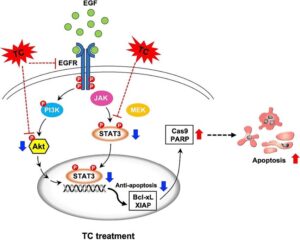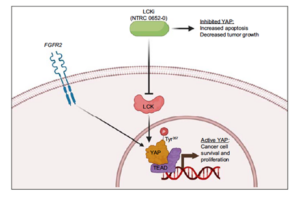Archives

Scientific Update: FGFR2 Pathway Activation as a Therapeutic Biomarker for FGFR2 Inhibitors
Fibroblast growth factor receptor 2 (FGFR2) is among cholangiocarcinoma's most frequently altered genes. Chromosomal fusions and gene rearrangements are particularly…

Scientific Update: Phase II Study of a Novel Immunotherapy Combination for Cholangiocarcinoma
Kelly Butler The first line of treatment for unresectable cholangiocarcinoma is gemcitabine plus cisplatin, a combination of two traditional chemotherapies…

Scientific Update: Bile MicroRNA Profiling May Facilitate Cholangiocarcinoma Diagnosis
In diagnosing cholangiocarcinoma, it is essential to distinguish it from other conditions that can have similar presentation, such as pancreatic…

Scientific Update: Modulating Alternative Splicing to Unleash Anti-tumor Immunity - A Novel Therapeutic Approach
Researchers have found around 100,000 proteins in the human body, but only 20,000 to 25,000 protein-coding genes. How is the…

Scientific Update: Tiliacorinine may Slow Cholangiocarcinoma Growth - Mechanistic Insights into a New Potential Therapy
Tiliacora triandra is a plant native to Southeast Asia used for cooking and traditional herbal medicine. Multiple studies have also…

Scientific Update - Bile Acids in Cholangiocarcinoma: A Potential Diagnostic Biomarker
Bile acids are the primary component of bile, a fluid that helps digest fats. In addition to aiding in digestion,…

Scientific Update – Radiation-releasing “seeds” may slow cholangiocarcinoma growth by inhibiting VEGFR2 singling
External radiation has been used to treat cancer for many years, but recent technological advances have led to a new…

Scientific Update - Circular RNA (circZNF215) in cholangiocarcinoma: A new possible therapeutic target
About 98% of the human genome is non-coding, meaning it does not contain the genetic code to make proteins. However,…

Monthly Scientific Update – April 2023
Radiomics Models May Help Identify Candidates for Surgery Most cholangiocarcinoma tumors are unfortunately detected at advanced stages, but surgical resection…

Monthly Scientific Update – February 2023
LCK Inhibitor: A Novel Potential Therapy for Cholangiocarcinoma A variety of signaling pathways can become overactive in cancer to promote…